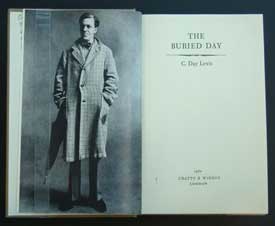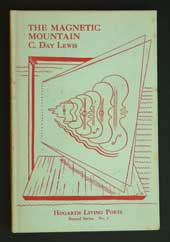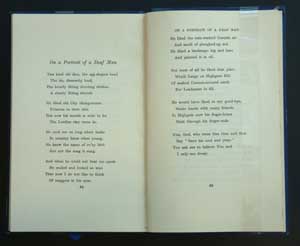
"£100 & a butt of sack yearly"
| Eusden & Cibber |
| Whitehead |
| Warton |
| Pye |
| Southey |
| Wordsworth |
| Tennyson |
| Austin & Bridges |
| Masefield |
| Lewis & Betjeman |
| Hughes & Motion |
| Refusals & Rejects |
Cecil Day Lewis & John Betjeman |
|
|
View large (200 Kb) |
On 14 December 1967, Cecil Day Lewis (1904-1972) received a letter from Harold Wilson, the Prime Minister, wanting his 'consent' to be poet laureate in Ordinary to Her Majesty. Before the Queen's official announcement on 2 January 1968, 'it meant a lot of family giggling over Christmas' (Lewis). By 1968, the post had no duties apart from presiding over the committee that selected the winner of the Queen's Gold Medal for poetry. Although content with the money - £70 plus £27 'in lieu of a butt of sack' - Lewis made it clear to anyone who listened that he would have preferred the wine. On display is a reprint of The Buried Day, Lewis's autobiography up to 1940. _________________________________________________________
|
|
View large (152 Kb) |
In his The Poets Laureate, Kenneth Hopkins claimed that if Lewis had lived ten years longer 'he would have raised the Laureateship to a position in the public consciousness which it had not held since Tennyson, and such as before Tennyson it had hardly held at all.' When Leonard Woolf received the completed draft of The Magnetic Mountain he exclaimed it was 'the best long poem that I have read for many a long day.' Overtures (1938) was a more sombre work, capturing the Munich Mood and the impending war. Both items on display are first editions. ___________________________________________________________
|
|
View large (105 Kb) |
Although some critics have called John Betjeman (1906-1984) a light-weight versifier who kept to traditional verse forms and rhyming schemes, his poetry is surprisingly serious, is very accessible, and was certainly popular with the reading public. When Geoffrey Grigson, who was politically unsympathetic to Betjeman, read a draft of Old Lights he wrote: ' They are some of the best he has done, I think, and I hope they go as well as they deserve to.' ___________________________________________________________
|
|
View large (130 Kb) |
On 10 October 1972, Sir John Betjeman (he was knighted in 1969) received a telephone call from Buckingham Palace that informed him of his appointment as poet laureate. Besieged by the media, he told them: 'I don't' think I am any good and if I thought I was any good I wouldn't be any good. I don't watch much television, except for Coronation Street and Alf Garnett who is outrageous but I am going to watch myself tonight on television.' Betjeman was also a film critic, an editor of the Shell Guides, and an active conservationist. This volume is edited by his daughter, Candida Lycett Green. ___________________________________________________________
|



